Key Takeaways:
55% of employed Americans work for fitness-conscious employers.
Employees with fitness-conscious managers are more productive, more trusting of leadership, and more satisfied with their income.
Employees working for fitness-conscious leaders are 63% more likely to trust their leadership than those working for fitness-averse leaders.
Employees working for fitness-conscious leaders are promoted nearly 2x more frequently (every 3.7 years) than those under fitness-averse leaders (every 6.6 years).
Employees working for fitness-averse leaders are 2.7x more likely to not plan long-term employment with their current employer than those working for fitness-conscious ones.
Fitness-conscious business leaders are 13% more likely to feel greater overall confidence than fitness-averse ones.
On average, fitness-conscious leaders report 29% greater business revenue than fitness-averse leaders.
Does Fitness-Focused Leadership Benefit Employees?
It turns out that a leader's commitment to fitness benefits them more than just themselves — it can also impact their team's job satisfaction, motivation, and loyalty. Here's what our study uncovered about the effects of fitness-minded leadership on employees.
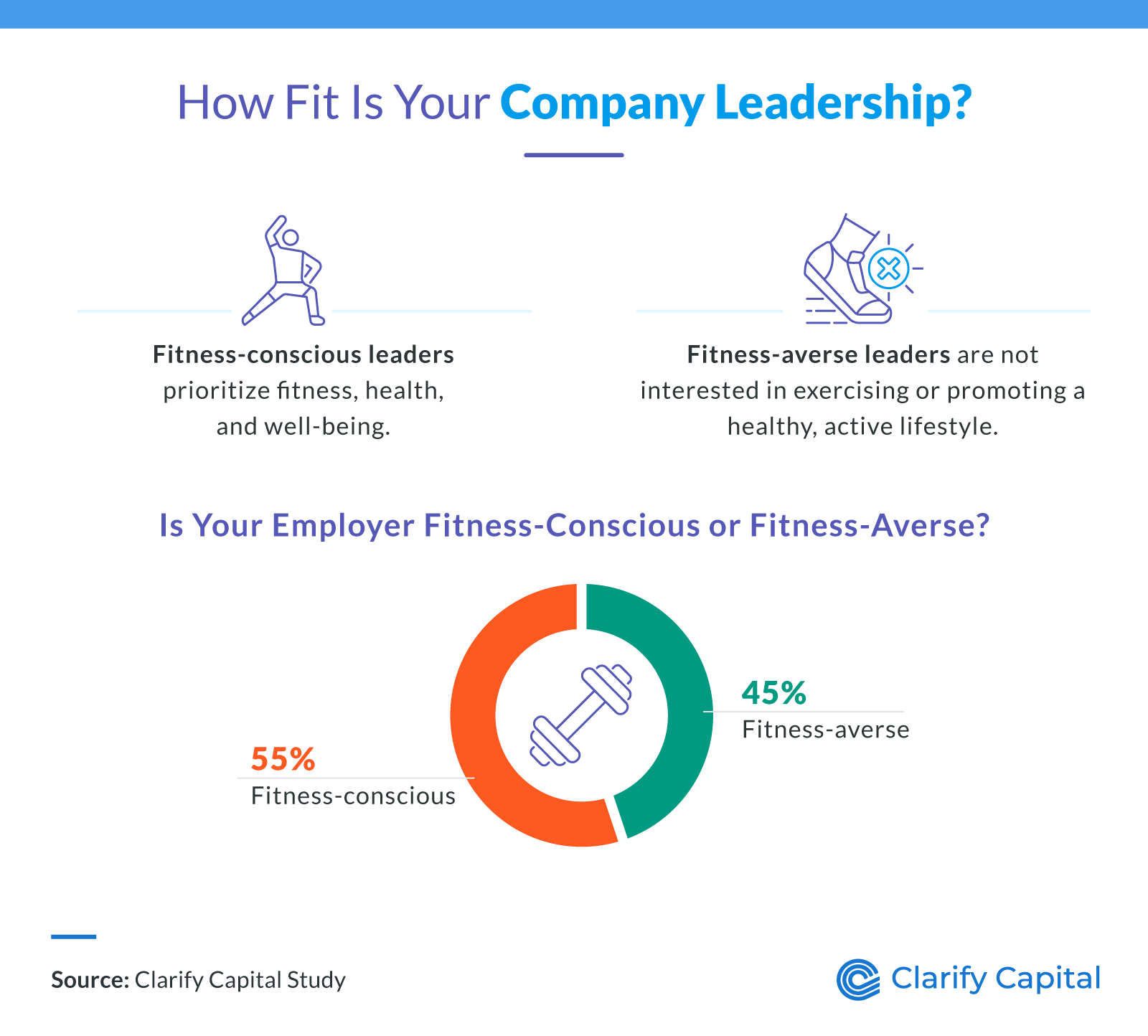
More than half of employees (55%) described their employer's leadership as fitness-conscious. They clearly let their employees know that fitness, health, and well-being were important aspects to focus on, whether in or out of the office. Slightly fewer (45%) viewed their leaders as fitness-averse, which means they had little interest in promoting a healthy and active lifestyle.
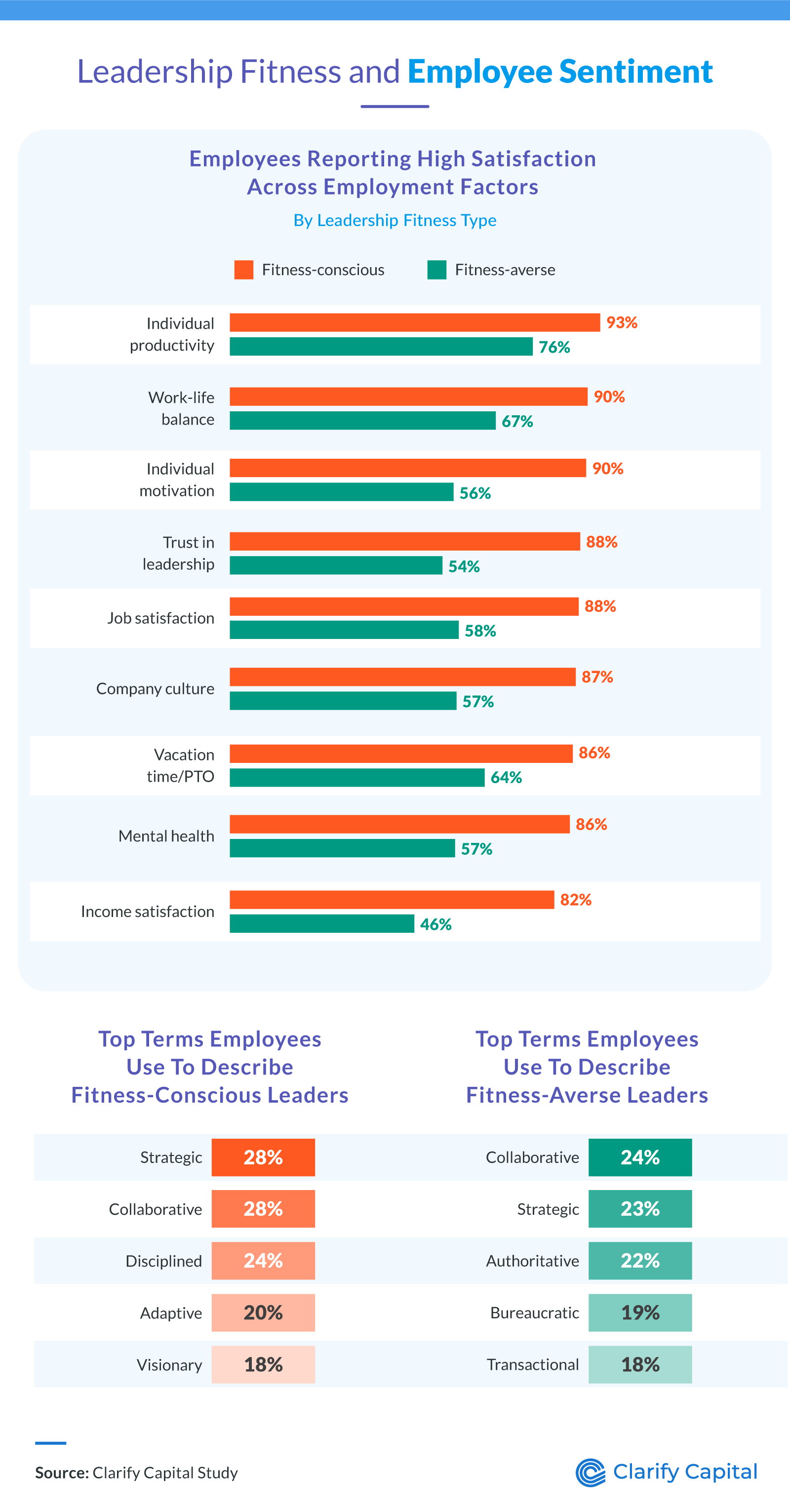
Employees with fitness-conscious leaders reported several benefits. Compared to employees with fitness-adverse employers, they were:
78% more likely to be satisfied with their income.
63% more likely to trust their leadership.
61% more likely to feel positive about their motivation.
34% more likely to feel positive about their work-life balance.
22% more likely to feel positive about their productivity.
Among employees with fitness-conscious leaders, 20% described their leadership as adaptive. About the same number of employees with fitness-averse leaders — 22% — viewed their bosses as authoritative.
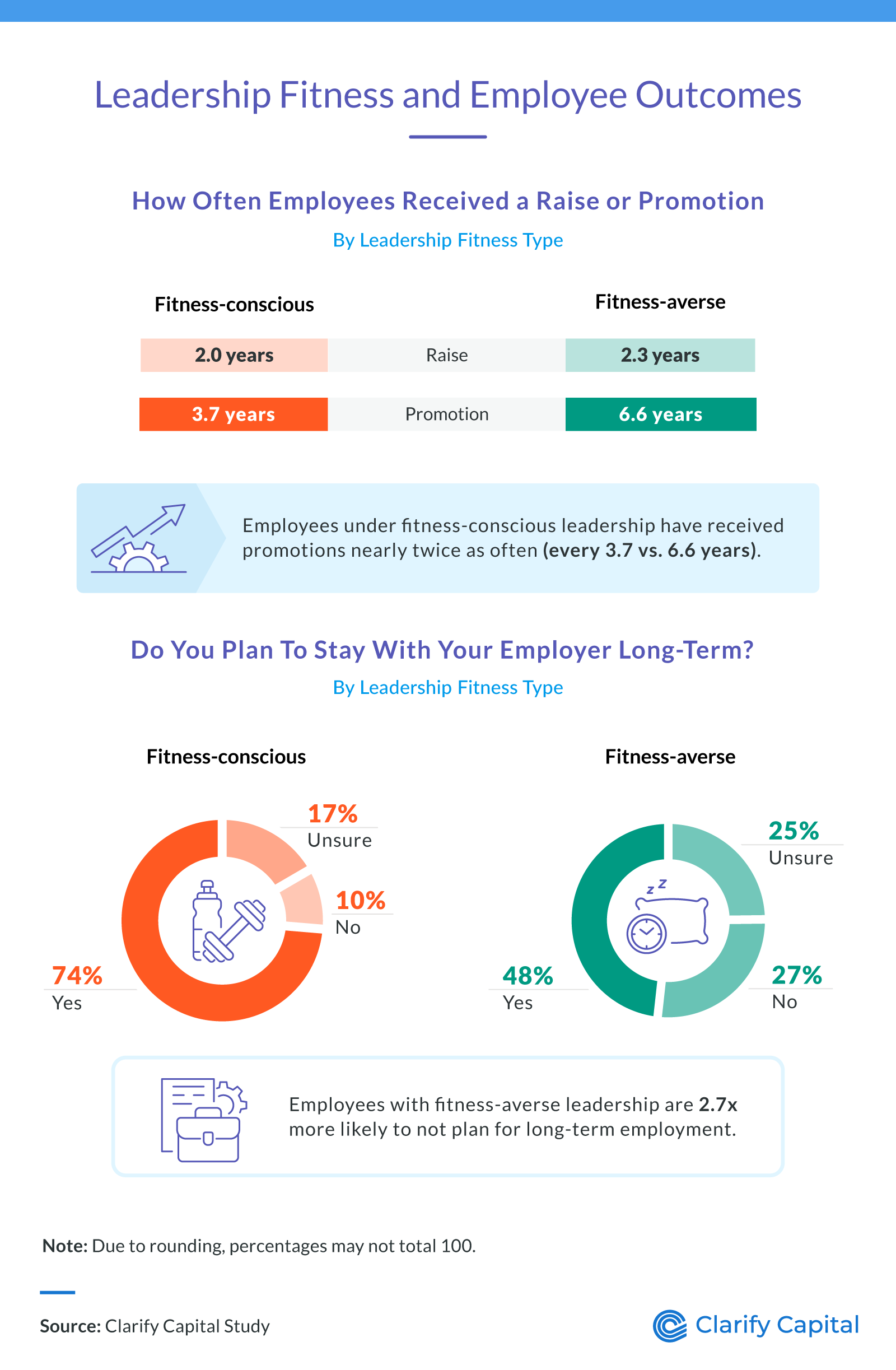
Promotion rates highlight the gap between these two groups of employees. Those with fitness-conscious leaders advanced nearly twice as often, receiving promotions every 3.7 years compared to 6.6 years under fitness-averse leaders.
Long-term commitment also varied significantly. Employees with fitness-conscious leaders were 54% more likely to envision a long-term future with their employer, while those with fitness-averse leaders were 2.7 times more likely to consider leaving.
Fitness-conscious leadership also inspired personal fitness: 43% of employees with fitness-minded leaders felt motivated to adopt their own fitness routines. Wellness-centered leadership can clearly make a big difference in employees' lives.
The Link Between Fitness and Leadership Confidence
Let's next look at how fitness routines affect business leaders' confidence, financial outcomes, and approach to problem-solving.
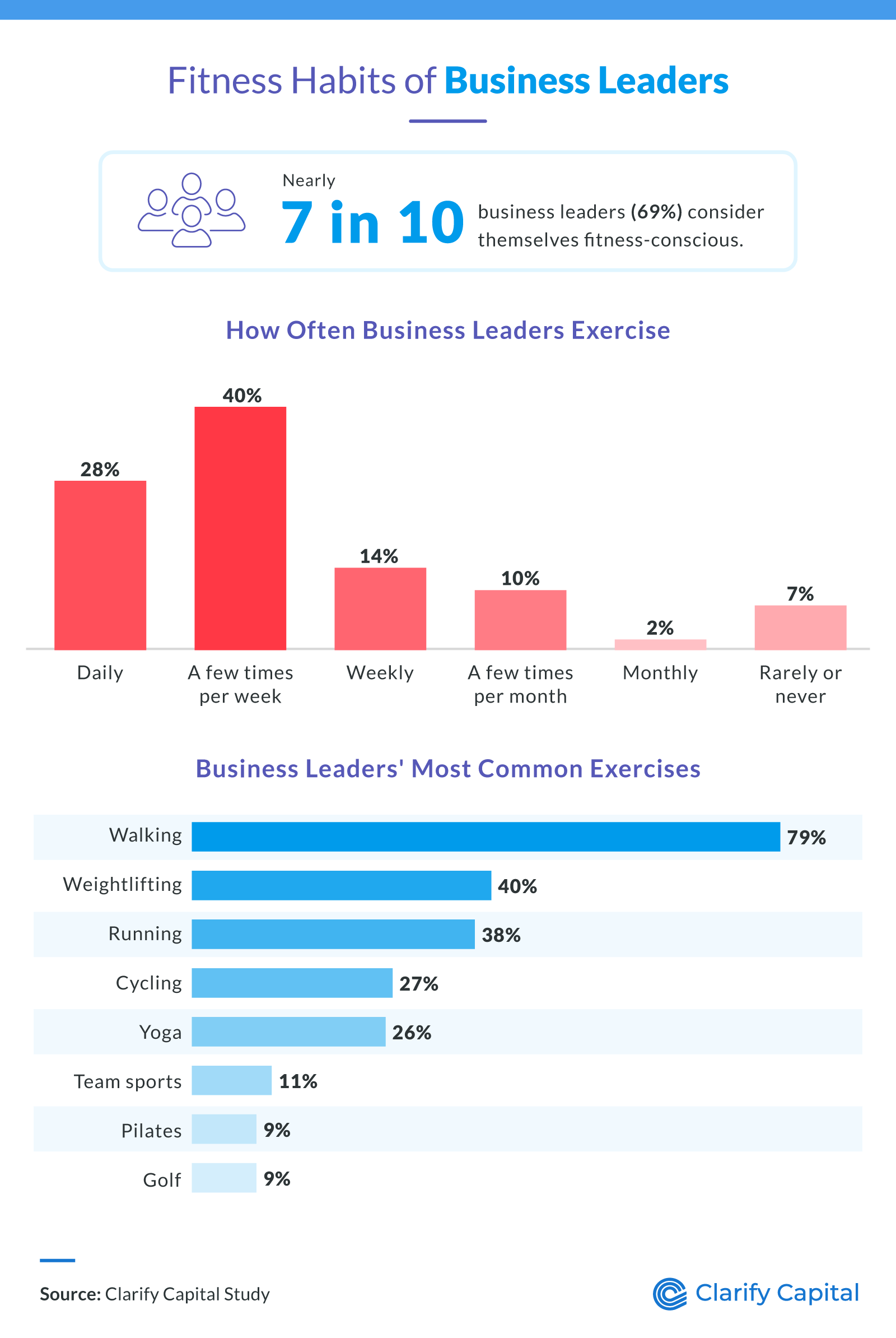
Nearly 7 in 10 leaders (69%) identified as fitness-conscious, with 68% exercising at least a few times each week. Walking was the most popular activity by far, showing that many leaders have kept fitness easy to access and manage — no complicated workout routines required.
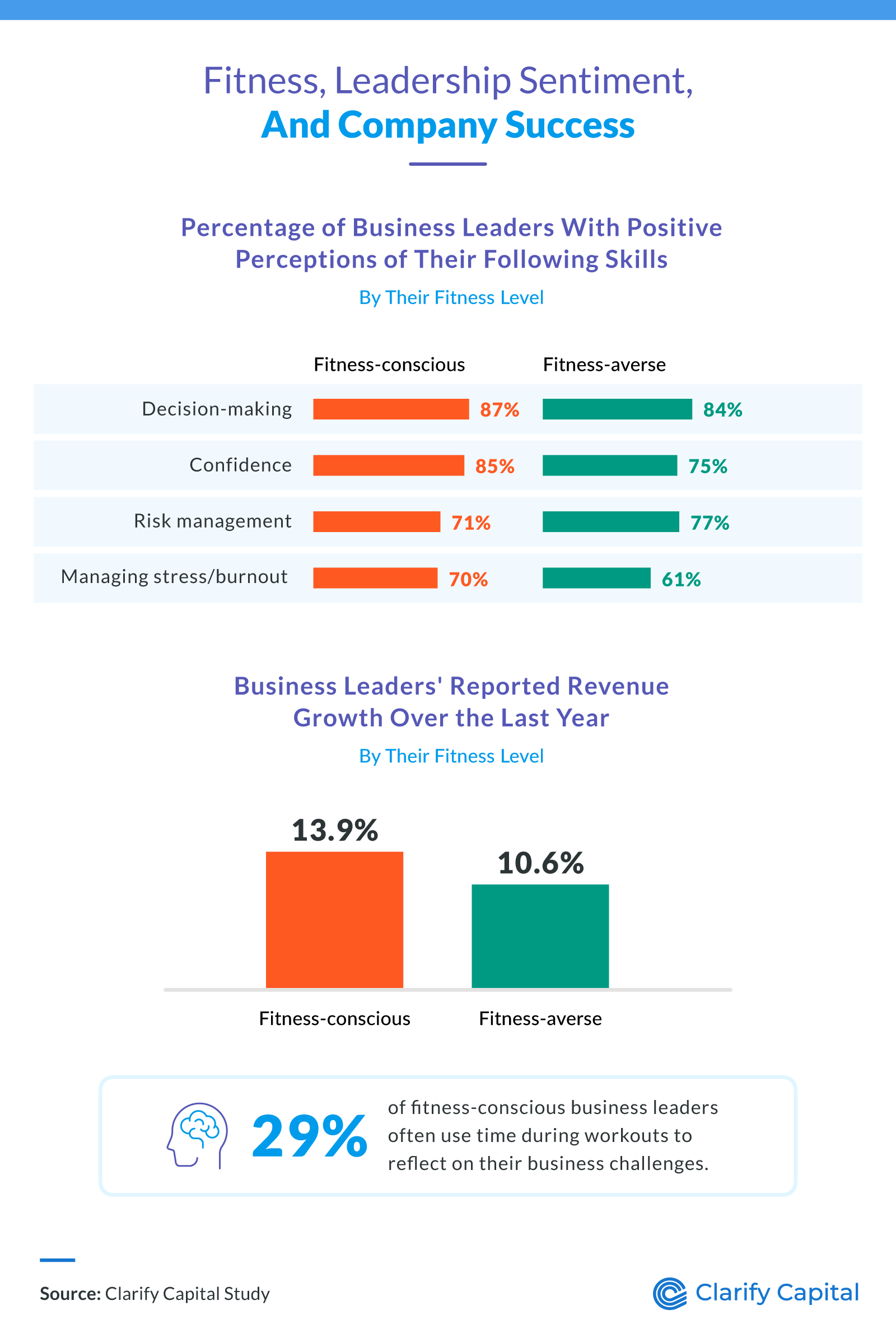
Fitness-conscious leaders reported higher confidence, with a 13% increase over fitness-averse leaders. They also saw an average of 29% greater business revenue, hinting at a connection between fitness and business success. Workouts also provided reflection time for some leaders. Around 29% frequently used exercise sessions to consider business challenges, while 34% did so occasionally.
Fitness-Focused Leadership Drives Team Success
When leaders prioritize fitness, the effects reach beyond their own well-being. This study shows that fitness-conscious leaders not only feel more confident and report higher business revenue, but they also foster stronger teams. Employees under these leaders are more satisfied with their jobs, more motivated, and more likely to see a future with their company. Adopting a fitness-focused approach may just be a key ingredient for leaders looking to inspire growth and loyalty in their teams.
Methodology
We surveyed 503 employees about their company leadership and employment sentiments and experiences; 55% reported having fitness-conscious business leaders. We also surveyed 502 business leaders about their fitness habits and company success; 69% reported being fitness-conscious.
About Clarify Capital
Clarify Capital helps business owners secure the financing they need to thrive in today's competitive marketplace, including no-doc business loans and fast business loans. Our tailored financial solutions support entrepreneurial dreams, turning visions into reality.
Fair Use Statement
We encourage you to share these findings about fitness leadership in the workplace for noncommercial use; please attribute the original source with a link.

Bryan Gerson
Co-founder, Clarify
Bryan has personally arranged over $900 million in funding for businesses across trucking, restaurants, retail, construction, and healthcare. Since graduating from the University of Arizona in 2011, Bryan has spent his entire career in alternative finance, helping business owners secure capital when traditional banks turn them away. He specializes in bad credit funding, no doc lending, invoice factoring, and working capital solutions. More about the Clarify team →
Related Posts





